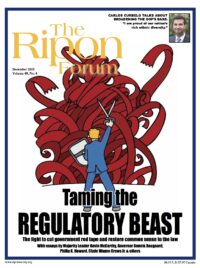
As Philip Howard correctly pointed out in his 1995 book, The Death of Common Sense, government has systematically replaced Adam Smith’s invisible hand with the visible fist of government regulation. Unfortunately, government officials have doubled down on this losing proposition over the last twenty years. Even more unfortunately, it is the American people who must pay for this failed bet and are paying dearly – to the tune of $1.9 trillion.
Today, the need to reverse this course has never been greater. As evidence of this, all of the presidential hopefuls from across the political spectrum have said that they are in favor of striking onerous regulations to help get government out of the way of businesses and help grow the middle class. This aphoristic statement conceals as much truth as it contains, as several of these same candidates also want to impose new regulations. This essay highlights the records of top Republican and Democratic candidates and outlines what they are likely to do if elected as President.
When it comes to the Republican Party, every candidate is united on two fronts: the need to repeal and replace the Affordable Care Act and the idea that the middle class has been harmed due to overregulation. Some are more vociferous on these than others, with several supporting a freeze on new regulations, but the message is all largely the same. When it comes to growing the middle class, however, the differences are vast.
When it comes to the Republican Party, every candidate is united on two fronts: the need to repeal and replace the Affordable Care Act and the idea that the middle class has been harmed due to overregulation.
Donald Trump wants to tackle the issue of a stagnating middle class by making it more expensive for American consumers to buy imports through aggressive tariffs and quotas. The idea here is that forcing American consumers to buy more American made products will create middle class jobs. Sadly, making consumers pay more for goods and services is a path towards poverty, not prosperity.
Marco Rubio is making a name for himself with his regulatory budget plan, essentially the idea that the only way to get a new regulation passed is to strike an equally costly regulation from the books. In his time in the Senate, Rubio has been a champion of deregulation, notably his 2012 vote to allow individuals to import FDA-approved drugs from Canada. Allowing people to buy approved drugs from approved vendors in other countries would help keep healthcare costs down for everyone. He also wants to restrict H1B visas to high skilled foreign workers and ban companies that “abuse them from ever using them again,” but it’s unclear what his metric will be.
On the Democrat side, the general consensus is that corporate greed and Wall Street excess are ruining the middle class and that the solution is to regulate the behaviors that cause these problems to go away. What’s also clear is that the Democrats believe – given the primacy these issues have received at the debates – that imposing these new regulations is more important than striking onerous ones. To be sure, there are differences between Hillary Clinton and Bernie Sanders, but they don’t seem as wide as the differences between the Republicans (at least, at the time of this writing).
Hillary’s campaign focuses on excess corporate greed and the idea that the one-percent are exploiting the workers, earning record profits while the wages of the middle class have either stagnated or declined. At the first debate, she opened by saying that she wants to “find ways so that companies share their profits with the workers who helped to make them.” She wants to regulate companies into giving paid family leave, has voted for mandatory equal pay for women, and wants to promote long-term growth by discouraging short-term profits through tax policy.
On the Democrat side, the general consensus is that corporate greed and Wall Street excess are ruining the middle class and that the solution is to regulate the behaviors that cause these problems away.
Bernie Sanders almost certainly agrees with Hillary Clinton on the above, but places a larger share of the blame for the current economic disaster on Wall Street. He wants to “reregulate” the banking system, believing that the Great Recession was a direct product of banking deregulation; deregulation which according to a Mercatus Center study didn’t happen. He also wants to reign in Wall Street speculating through a special tax and use the revenue from this new tax to pay for college tuition. Whether or not this plan is viable remains to be seen, but history has shown that college tuition has increased almost in lock step with increases in government subsidies for education, suggesting that this is perhaps not the wisest of plans.
While each candidate has recognized the need for relief from a broken regulatory system, most want to replace or supplement what we have currently. There are two exceptions to this: Ben Carson and Jeb Bush. As of this writing, it’s difficult to say in detail what Carson would want to regulate, though we do know from his 2012 book that he believes some markets do need regulation, with health insurance being his go-to example.
When it comes to Jeb Bush, he talks the talk of a deregulator and, as his track record in Florida demonstrates, he also walks the walk of a deregulator. He has a specific regulatory reform plan. Like Rubio, he wants a regulatory budget. He also wants to get Washington out of the business of regulating and return that power to the states, reserving federal power only for cases where “state-based solutions are insufficient.” Further, he wants to “streamline the permit process so that infrastructure projects can be permitted or rejected within two years” and put a freeze on new regulations. These are lofty goals that will lead to a tremendous reduction in the costs of overregulation if he can implement them.
While there may be problems in society that require regulation to solve, 1) that number is closer to zero than most candidates seem to think and 2) the number of problems that overregulation has caused is far greater. Looking through the Federal Registry, every single industry has regulations in place that may have been sensible in 1975 but are patently absurd in 2015, with the number of regulations growing each and every year since. By constantly changing the rules, government has created intense regime uncertainty in the business world and wrought havoc on our economy. The current administration has been especially good at creating this regime uncertainty, and it looks as if the Democratic candidates are most likely to continue this trend.
David J. Hebert has a Ph.D. in Economics from George Mason University and is currently an assistant professor of Economics at Ferris State University. His specialties include taxation, regulation, and public policy.




